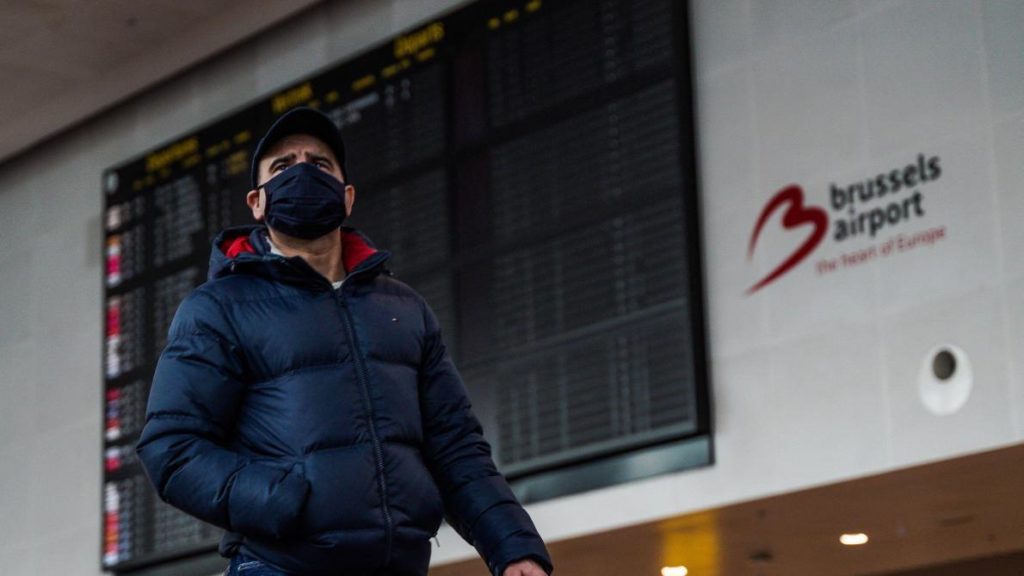As more cases of the new Omicron variant of the coronavirus are being reported across the world, more and more countries are imposing tougher travel restrictions.
The variant, labelled B.1.1.529 and named Omicron (the 15th letter in the Greek alphabet), was first reported to the World Health Organisation (WHO) by South Africa on 24 November and is raising concerns across the world that it may significantly reduce the effectiveness of vaccines.
It is thought the variant, which has been classified as a variant of concern (VOC) by the WHO, may even be more infectious than the delta variant, which is currently driving the fourth wave across the western world, because of the large number of mutations, however, it is unclear whether it also makes people sicker.
So far, people infected with the new mutation in South Africa are not seriously ill, according to the president of the South African Doctors' Association, Angelique Coetzee, who told the BBC that the main complaints are sore muscles and fatigue.
Entry bans and closed borders
The European Commission called on the EU Member States to introduce a general European flight ban to and from southern Africa on Friday morning to slow down the advance of the potentially highly infectious variant. Several countries have now followed this advice.
The first Belgian infection with the variant was reported on Friday, prompting Belgium to suspend flights to and from seven countries in southern Africa, including Botswana, Swaziland (eSwatini), Lesotho, Mozambique, Namibia, South Africa and Zimbabwe from Sunday 28 November until the end of this year, at least.
“Additionally, returning travellers are required to spend ten days in quarantine upon entering Belgium," Prime Minister Alexander De Croo said during a press conference following the Consultative Committee meeting on Friday.
Belgium's Foreign Affairs ministry has advised Belgians still stranded in southern Africa to "contact their travel agency or tour operator so that they can find a solution to return to Belgium."
"At the moment, there are still commercial options on certain routes between southern Africa and Belgium," the Foreign Affairs spokesperson told Belga news agency on Sunday.
Israel, where one case of the new variant has been confirmed and seven possible additional cases are under investigation, has gone the furthest with its new measures, as it decided to close its borders for all foreigners from Sunday evening.
It has also tightened measures for returning travellers, who now all have to go into isolation. Fully vaccinated people can leave quarantine after three days if they pass a negative PCR test, while non-vaccinated people are not allowed out of isolation until after seven days if the test is negative.
Related News
- Pharmaceutical companies looking into vaccines against new variant
- ECDC issues threat assessment about new COVID-19 variant, WHO designates it as a variant of concern
In Europe, two infections with the new variant were detected in Germany, one in Italy and one in the Czech Republic, almost always in travellers who returned from countries in southern Africa, resulting in all three countries imposing travels bans on multiple southern African countries.
Two cases were also detected in the United Kingdom, which has since announced temporary, tougher measures for travellers entering the country to slow the spread of the Omicron variant of the coronavirus.
"All international arrivals to take a Day 2 PCR test and self-isolate until they receive a negative test," a statement from 10 Downing Street confirmed on Saturday. Face masks will also once again be made compulsory in shops and on public transport.
'Making us the culprit'
By imposing these bans, countries are going against the original advice from the WHO, which stressed the importance of waiting to see what the data will show.
“We’ve seen in the past, the minute there’s any kind of mention of any kind of variation and everyone is closing borders and restricting travel. It’s really important that we remain open, and stay focused,” the WHO's Head of Emergencies, Dr Michael Ryan, said.
In response to these bans being imposed, South Africa has said it is being made the scapegoat, adding that it is essentially being "punished for its advanced DNA research techniques and its ability to detect new variants more quickly."
Meanwhile, western countries, including Belgium and the UK, are being criticised for urgently speeding up booster vaccination programmes in anticipation of the Omicron variant, even though more than 90% of people are still unvaccinated in developing countries.
Failure to help vaccinate sub-Saharan Africa—still barely 4% of the population—left us all exposed to risk of a new, more virulent #COVIDvariant.
News of #Omicron is an urgent reminder of why we need to do even more to vaccinate the world.https://t.co/3qJwgZHdfA pic.twitter.com/vEtwg6Wq3y — Kristalina Georgieva (@KGeorgieva) November 26, 2021
"Our failure to help vaccinate sub-Saharan Africa is exposing us all to a new, even more, virulent Covid variant," the International Monetary Fund (IMF)'s Managing Director Kristalina Georgieva said. 'The Omicron news is an urgent spur to do even more to vaccinate the whole world."

